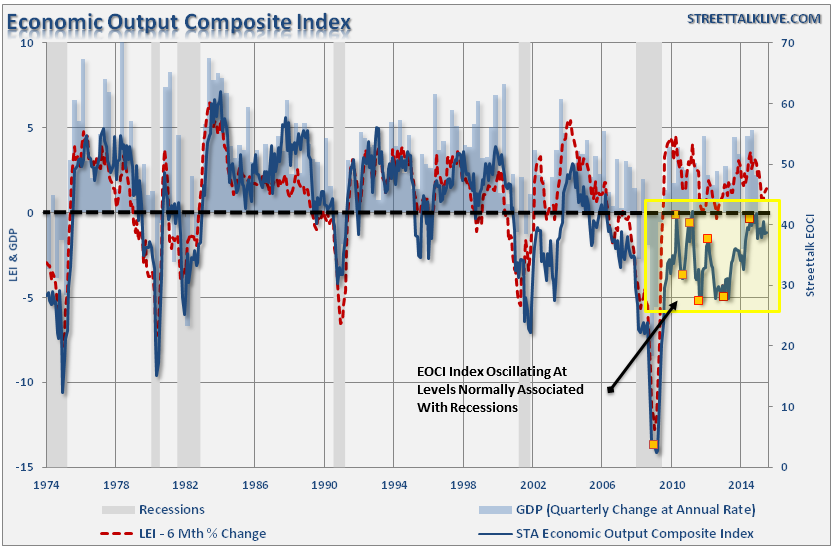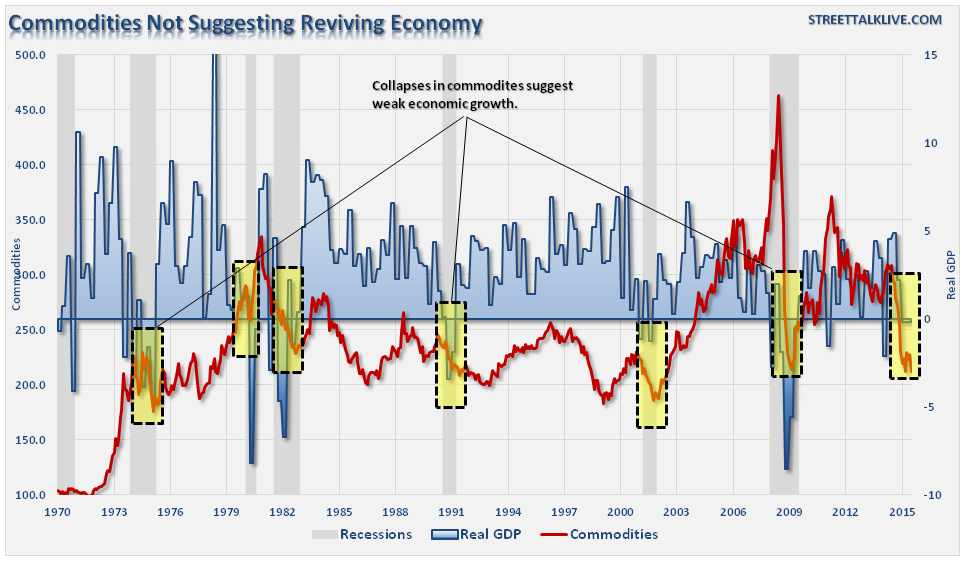I have been suggesting for quite some time that the Federal Reserve is stuck in a "liquidity trap", which makes it very difficult for monetary policy to be effective. More importantly, I suggested in January that the Fed is being forced to choose between the "lesser of two evils," to wit:
"The real concern for investors and individuals is the actual economy. There is clearly something amiss within the economic landscape, and the ongoing decline of inflationary pressures longer term is likely telling us just that. The big question for the Fed is how to get out of the potential trap they have gotten themselves into without cratering the economy, and the financial markets, in the process.
It is my expectation, unless these deflationary trends reverse course in very short order, that if the Fed raises rates it will invoke a fairly negative response from both the markets and economy. However, I also believe that the Fed understands that we are closer to the next economic recession than not. For the Federal Reserve, the worst case scenario is being caught with rates at the "zero bound" when that occurs. For this reason, while raising rates will likely spark a potential recession and market correction, from the Fed’s perspective this might be the “lesser of two evils.”
I bring this up because Caroline Baum penned a similar bit of commentary for MarketWatch:
"What's the urgency with an economy chugging along at 2-something percent and low inflation? I suspect Fed officials are terrified of being caught with their pants down, in a manner of speaking. Should some unforeseen event come along to upend the economy, the Fed's arsenal would be dry. They'd like to put some space between their policy rate and zero."
During Janet Yellen's most recent testimony to Congress, she has suggested that now is the time for the Federal Reserve to begin increasing interest rates, thereby tightening monetary policy, as the economy improves.
"We are close to where we want to be, and we now think that the economy cannot only tolerate but needs higher interest rates'"
She is, of course, basing the assumption of "close to where we want to be" on the improvement in labor market conditions, rising inflationary pressures and expectations of 3% economic growth. Unfortunately, those expectations have repeatedly fallen short in the past, which has kept the Fed rate hiking campaign on hold.
Currently, there is mounting evidence that the global economy is cooling rather than heating up.
Cowen recently downgraded shares of Apple (NASDAQ:AAPL) due to concerns from China. While China reported growth of 7% in their economy, there is substantial evidence that actual growth is likely well below that rate. To wit:
"While [management] commentary sought to re-assure, iPhone units were light even adjusting for channel inventory. Normally, this would not concern us but evidence of a widespread demand reset from China is mounting (auto numbers, (NYSE:UTX), (NASDAQ:FCS), (NASDAQ:LLTC) to name a few from what we watch)."
Of course, it is not just a potential slowing of China that is a signaling weaker economic growth. Since the end of QE-3 in October of last year, a mix of domestic economic surveys have weakened. The Economic Composite Output Index (EOCI) combines the Chicago Fed National Activity Index, Chicago PMI, several Fed regional manufacturing surveys, the NFIB Small Business Survey and the LEI Index. It is as broad of a measure of economic activity that currently exists.
The chart of the EOCI index below shows the impact of Federal Reserve interventions (gold squares) on economic activity and subsequent ends of those QE programs. The EOCI is compared to GDP and the 6-month percentage change of the LEI index.
The problem for the Fed is two-fold. First, the EOCI shows that the economy continues to operate at levels that have historically been associated with previous recessions. This suggests that the economy will likely be very sensitive to any tightening of monetary policy. Secondly, the index has already begun to decline, and checks on the current state of economic data points suggest a further weakening of the index in the months ahead.
Furthermore, a look at commodity prices is also suggesting that the economy is weaker than headline statistics currently suggest.
The Federal Reserve raises interest rates to slow economic growth to keep an economy from overheating, which would potentially lead to a sharp rise in inflationary pressures. Since commodities are the basis of everything that is bought, consumed or other utilized; if there were indeed inflationary pressures on the rise commodity prices should be on the rise. As shown, this is clearly not the case.
In fact, declines in commodity prices have historically been associated with declines in economic activity as shown in the highlighted boxes. While not every decline in commodity prices led to a recession, and I am not making that case, there is a high correlation between the ebb and flow of commodity prices and economic activity, as would be expected.
As I stated recently, the Fed may have missed their best opportunity to hike interest rates.
"Lastly, the Federal Reserve's ongoing interventions, as was their intention, inflated asset prices and boosted consumer confidence. However, the Fed should have utilized that strong momentum and relative complacency in the markets as cover for beginning their interest rate increases. Instead, they allowed the markets to over-inflate and now run the risk, when combined with increasing global risks like Greece and China, of "deflating" asset prices too quickly this late in the market cycle."
As I have suggested previously, Ms. Yellen likely realizes that hiking rates at this late stage of the economic cycle is extremely risky. However, she also understands the danger of being caught in an economic downturn with interest rates near the zero-bound.
Economic indicators, China and commodities (including oil prices) are all suggesting that the Fed should NOT raise interest rates in September. This is also a conclusion that Caroline came to as well.
"The Fed scrapped its intended June lift-off because of concerns about the decline in first-quarter U.S. growth. Broad-based weakness in commodity prices is generally symptomatic of weak global demand. If the Fed is at all uncertain about its decision to start normalizing rates, it already has the excuse it needs."
Of course, the Fed may hike and just "hope for the best."


